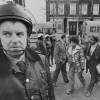Two days after her 14th birthday, Leola Hampton boarded a school bus that would launch her into the heart of one of the most divisive and defining moments in Boston history: court-ordered school desegregation.
On Sept. 12, 1974, she and her older sister, Linda Starks-Walker, boarded a bus from their home in the predominantly Black neighborhood of Roxbury into the white, working-class neighborhood of South Boston. It was the start of a violent and virulently racist high school experience.
“Can you imagine just being hated?” asked Hampton. She described the crowds of people outside of what was then South Boston High School, who targeted her and other Black children with taunts, racial slurs and rocks thrown at school bus windows. “You see the angry faces, you see the disdain, you see that everything about you that makes you human, they despise.”
“Never Cried”: Boston’s Busing Legacy, a short documentary from GBH News, examines how the trauma of what became known as Boston’s busing crisis has been passed to younger generations, and what this means for the future of a city that — like Leola and Linda — is still healing 50 years after the first buses rolled.
In June 1974, Judge Arthur Garrity ruled that Boston Public Schools still separated students by race 20 years after the landmark Supreme Court decision Brown v Board of Education, which had banned school segregation. Garrity’s remedy was to bus Black and white students across the city to integrate schools — a decision that was met with great resistance.
“It was like a fire. And you watch how a fire consumes itself and keeps consuming everything around it. That’s what the city looked like,” said Gary Bailey, professor and MSW program director at Simmons University School of Social Work. “How do you then begin to think about erasing that kind of experience from your psyche? You don’t.”
Fifty years later, Hampton and Starks-Walker are among those calling for a wider conversation about the lingering impact of the busing crisis even as they continue to reckon with the trauma they experienced.
“Me and my sister never talked about it,” said Starks-Walker. “I never said ‘Leola. how do you feel?’ And she never asked me about how I felt about it. We just moved on with our lives. Until now.”








